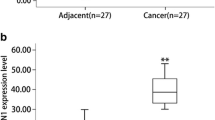Abstract
The aim of this study was to detect MTA2 expression in pancreatic ductal adenocarcinoma (PDA) and to analyze its association with prognosis of PDA patients. MTA2 mRNA and protein expression were determined by real-time quantitative reverse transcriptase-polymerase chain reaction and immunohistochemistry in specimens of primary cancer and their adjacent noncancerous tissues in PDA patients. We found that MTA2 mRNA and protein expression levels were both significantly upregulated in PDA lesions compared with adjacent noncancerous tissues. Immunohistochemistry showed that high MTA2 expression was correlated with poor tumor differentiation, TNM stage, and lymph node metastasis. Kaplan–Meier survival analysis showed that patients with high expression levels of MTA2 showed lower overall survival rate than those with low expression levels. Multivariate analysis showed that high MTA2 protein expression was an independent prognostic factor for PDA patients. Our study suggests that overexpression of MTA2 may play an important role in the progression of PDA and MTA2 expression may serve as a biomarker for poor prognosis for PDA.



Similar content being viewed by others
References
Zimmon DS, Ferstenberg R. Pancreatic carcinoma. N Engl J Med. 1992;326:1782.
Goonetilleke KS, Siriwardena AK. Systematic review of carbohydrate antigen (CA 19-9) as a biochemical marker in the diagnosis of pancreatic cancer. Eur J Surg Oncol. 2007;33:266–70.
Lin M, DiVito MM, Merajver SD, Boyanapalli M, van Golen KL. Regulation of pancreatic cancer cell migration and invasion by RhoC GTPase and caveolin-1. Mol Cancer. 2005;4:21. doi:10.1186/1476-4598-4-21.
Stanton KJ, Sidner RA, Miller GA, Cummings OW, Schmidt CM, Howard TJ, et al. Analysis of Ki-67 antigen expression, DNA proliferative fraction, and survival in resected cancer of the pancreas. Am J Surg. 2003;186:486–92. doi:10.1016/j.amjsurg.2003.07.002.
Terris B, Blaveri E, Crnogorac-Jurcevic T, Jones M, Missiaglia E, Ruszniewski P, et al. Characterization of gene expression profiles in intraductal papillary-mucinous tumors of the pancreas. Am J Pathol. 2002;160:1745–54.
Toh Y, Kuninaka S, Endo K, Oshiro T, Ikeda Y, Nakashima H, et al. Molecular analysis of a candidate metastasis-associated gene, MTA1: possible interaction with histone deacetylase 1. J Exp Clin Cancer Res. 2000;19:105–11.
Cui Y, Niu A, Pestell R, Kumar R, Curran EM, Liu Y, et al. Metastasis-associated protein 2 is a repressor of estrogen receptor alpha whose overexpression leads to estrogen-independent growth of human breast cancer cells. Mol Endocrinol. 2006;20:2020–35.
Nicolson GL, Nawa A, Toh Y, Taniguchi S, Nishimori K, Moustafa A. Tumor metastasis-associated human MTA1 gene and its MTA1 protein product: role in epithelial cancer cell invasion, proliferation and nuclear regulation. Clin Exp Metastasis. 2003;20:19–24.
Saito M, Ishikawa F. The mCpG-binding domain of human MBD3 does not bind to mCpG but interacts with NuRD/Mi2 components HDAC1 and MTA2. J Biol Chem. 2002;277:35434–9. doi:10.1074/jbc.M203455200.
Wong JJ, Hawkins NJ, Ward RL. Colorectal cancer: a model for epigenetic tumorigenesis. Gut. 2007;56:140–8. doi:10.1136/gut.2005.088799.
Yao YL, Yang WM. The metastasis-associated proteins 1 and 2 form distinct protein complexes with histone deacetylase activity. J Biol Chem. 2003;278:42560–8. doi:10.1074/jbc.M302955200.
Sobin LH, Wittekind CH. TNM classification of malignant tumours. 6th ed. New York: Wiley-Liss; 2002. p. 199–202.
Kelly K, Crowley J, Bunn Jr PA, Presant CA, Grevstad PK, Moinpour CM, et al. Randomized phase III trial of paclitaxel plus carboplatin versus vinorelbine plus cisplatin in the treatment of patients with advanced non-small-cell lung cancer: a Southwest Oncology Group trial. J Clin Oncol. 2001;19:3210–8.
Hennessy BT, Hanrahan EO, Daly PA. Non-Hodgkin lymphoma: an update. Lancet Oncol. 2004;5:341–53.
Fujita N, Kajita M, Taysavang P, Wade PA. Hormonal regulation of metastasis-associated protein 3 transcription in breast cancer cells. Mol Endocrinol. 2004;18:2937–49. doi:10.1210/me.2004-0258.
Zhang H, Stephens LC, Kumar R. Metastasis tumor antigen family proteins during breast cancer progression and metastasis in a reliable mouse model for human breast cancer. Clin Cancer Res. 2006;12:1479–86.
Adjei AA. Pemetrexed in the treatment of selected solid tumors. Semin Oncol. 2002;29:50–3.
Conflicts of interest
None
Author information
Authors and Affiliations
Corresponding author
Additional information
Da-Wei Chen and Yao-Fu Fan contributed equally to this paper.
Rights and permissions
About this article
Cite this article
Chen, DW., Fan, YF., Li, J. et al. MTA2 expression is a novel prognostic marker for pancreatic ductal adenocarcinoma. Tumor Biol. 34, 1553–1557 (2013). https://doi.org/10.1007/s13277-013-0685-3
Received:
Accepted:
Published:
Issue Date:
DOI: https://doi.org/10.1007/s13277-013-0685-3




